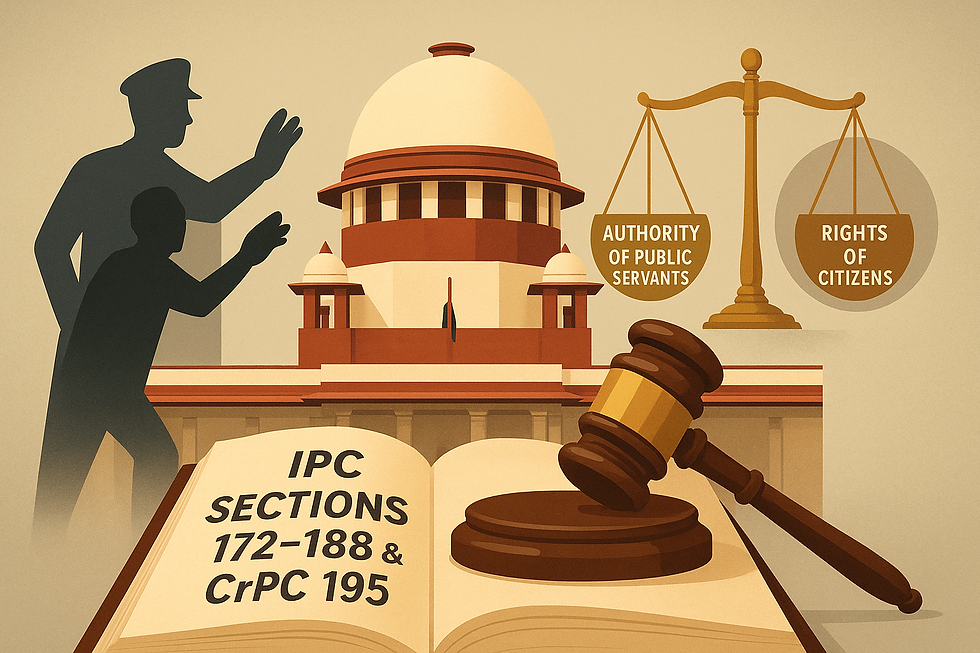Supreme Court Clarifies: Offences Under Sections 172–188 IPC Cannot Bypass Section 195 CrPC: Key Guidelines Explained
- Lawttorney.ai

- Aug 25, 2025
- 3 min read
Context:
The Supreme Court on the 20th August 2025 ruled that the courts cannot take cognizance of the offences under Sections 172 to 188 of the Indian Penal Code, which specifically deal with contempt of the lawful authority of Public Servants. It is extended to the point where the concerned public servant or the respective officer makes a written complaint.
Section 195(1)(a)(i) of the Criminal Procedure Code specifically deals with mandates a written complaint by a public servant. The court cannot sidestep this bar by splitting the charges and proceedings on the related offences from the similar facts.

Background of the Case:
The case happened on 3rd October 2013, the incident where Ravi Dutta Sharma, a process server that he was abused, restrained and mistreated at Nand Nagri Police Station by then appellant, i.e. Devendra Kumar, who is Station House Officer (SHO), while attempting to serve summons and warrants.
Ravi Kumar Datta reported this matter to the District and Session Judge, Shahdara, who directed the Civil Judge to file a complaint under section 195 of CrPC. Based on this, the CMM (known as Chief Metropolitan Magistrate) ordered the registration of an FIR under Sections 186, 341 and 342 of the Indian Penal Code.
Later, the SHO challenged the proceedings to the Delhi High Court, which the High Court dismissed his plea, and later he approached the Supreme Court of India.
Supreme Court Defines Scope Under Sections 172–188 IPC:
The Supreme Court of India observed that the court can only take cognizance under Sections 172 to 188 of the I.P.C. if the complaint is written by a public servant or his administrative superior, for voluntarily obstructing the public servant from the discharge of his public functions. Without a complaint by said person court can’t take cognizance. However, police may investigate the cognizance offence.
It must be noted that “Obstruction” under Section 186 of the IPC is not limited to physical force. Thereby, threats, verbal abuse or actions that make it difficult or Impossible in any way for the public servant to discharge duties also include and constitute an obstruction.
What are the six guidelines laid down by the Supreme Court for handling offences under Section 195 CrPC?
The court can't take offence under Section 172-188 IPC unless the public servant or their superior gives a written complaint.
A case falling under Section 195(1)(a)(i) of the CrPC cannot be classified as a different crime by the court to circumvent the restriction.
Upon different circumstances of fact claims and evidence in each case, facts can be split.
Before deciding whether the offence can be split, the court must apply two tests:
i. Extra charges added to avoid Section 195 of the CrPC.
ii. Whether the facts, in substance, constitute an offence requiring a public servant’ s complaint.
If an accused commits an offence not listed in Section 195, but if such offence is closely related to Section 195, then it may also apply depending upon the facts of the case.
Section 195(1)(b)(i)–(iii) and Section 340 did not bar the police from conducting the investigation. Post investigation, it bars the Court from taking cognizance. However, the court can file the case based on the FIR, and an investigation under Section 340 is a procedure permitted.
Important Note: The Bharatiya Nyaya Sanhita (BNS), 2023 reorganizes offences and renumbers them, placing the contempt-related provisions of IPC Sections 172–188 into Chapter XIII: Of Contempts of the Lawful Authority of Public Servants, under BNS Sections 206 onwards. |
Way Forward:
The court viewed that if an offence falls under Section 195 CrPC, the court cannot take cognizance until there is a written complaint from the public servant. It also observed that facts can’t be split or new charges added just to skip section 195. Whether other offences are included depends on how closely they are connected to the main offence and the facts of each case. The Court also clarified that obstruction not only includes the physical act but also the threats, abuse or wrongful prevention, which helps to see the broader aspect of Section 195 and the word obstruction.
Thereby, the Supreme Court disposed of the petition, allowing the petitioner to raise the Section 195 bar before the trial court, if a chargesheet is filed. The court also directed that the judgment be circulated to all High Courts to avoid similar procedural errors.
Empower Your Legal Practice with AI – Join Our Free Webinar!
Are you a legal professional looking to boost your efficiency and stay ahead in a competitive field? Discover the power of Lawttorney.AI – the cutting-edge tool designed to streamline legal research, automate tasks, and enhance productivity.
👉 Don't miss out! Reserve your spot in our FREE webinar and experience the future of legal practice today. Register Now




Comments